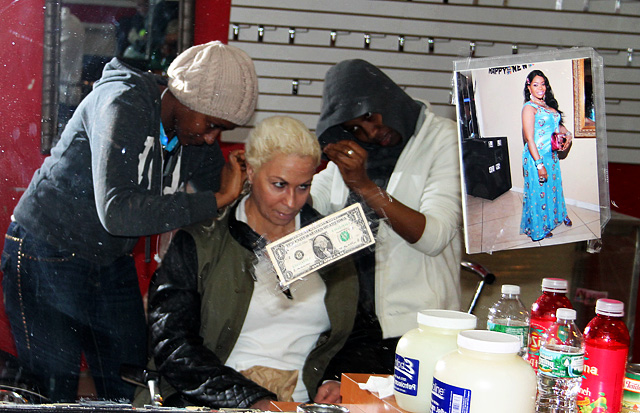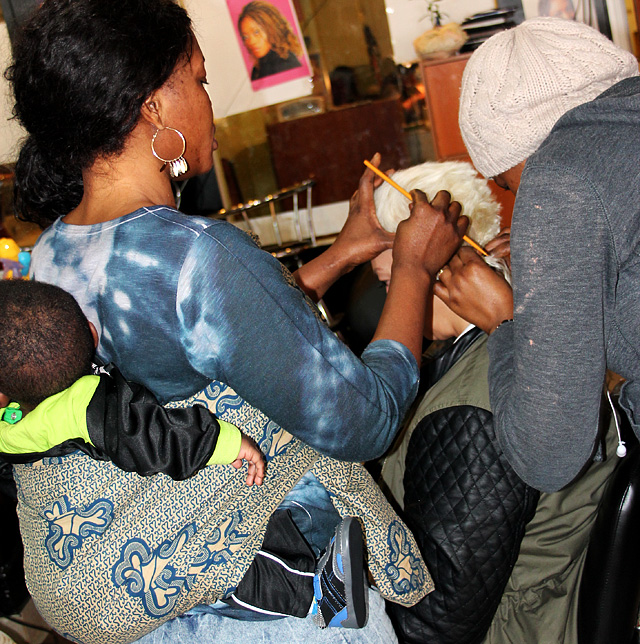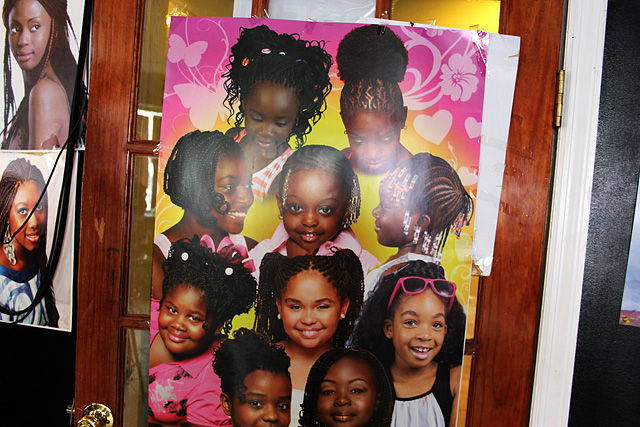Hair Braiders Face Growing Competition

By Bazona Bado
One can see African immigrant women along 125th Street in Harlem from Morningside to Lexington Avenue. They stand by train stations exits or entrances, sit in front of hair braiding salons or walk along, saying, “Hair braiding miss, good price.”
There are nine hair braiding salons in this eight-block stretch of 125th Street. Miss Napon, 50, from Burkina Faso in West Africa, owns the “Wend Kuni” hair braiding salon by the Harlem police precinct. Miss Napon says braiding transforms a woman. “When a woman gets her hair braided, her visage changes and has a good look,” she said.
Many immigrants make a good living working as hair braiders, she says, but the competition has grown along with the population of Africans in New York City. “Ten years ago, I braided a lady’s hair and she paid $900 and gave me $200 as tips,” she sighs. “Now the business is slowed.”
A 13-year–old girl comes into Napon’s salon with her father and she braids her hair for $100. A few minutes later, another hair braider named Asmata who rents a space in the salon comes in and says that the girl is her customer. Miss Napon disagrees and shows a picture from her smart phone, which she says is the girl’s photo. Asmata remains unconvinced. “You said you want to write about hair braiding,” said another hair braider, “now you have something to write about.”
Fanta Bamba who is from Guinea (West Africa) says she earns enough to support herself and others. “With hair braiding I own a house in Africa,” she says as she braids a customer’s hair, her two-year-old boy wrapped on her back. Bamba says she has earned enough to buy a car and that braiding is just as lucrative as restaurant or nursing work. “I am taking care of myself and my family,” she says.
Bintou, 18, says it is easy to make $400 a week braiding hair. This may not sound like a lot to many New Yorkers, but to African immigrants it is much more than they make at home. The costs depends on the style. And, says Bintou, one can always haggle. “This is an African business, there is not fixed price, everything is about negotiation,” she says. Styles include box braids, Senegalese twists, weaves, corn rows, invisible braids, buffalo too, and fish corn braids.

African hair braiding is a cultural and traditional art which has been practiced generation after generation. It dates back to Egypt in the time of the Pharaohs and still plays many roles in modern Africa. Eli Kanmouni, who works as hair braider in a remote village of Burkina Faso, explains by phone that hair braiding can be done for ceremonial occasions and that each different ethnic group had its own style. For example, she says, one style popular in her village is called Chicken Poop. The stylist braids strands of hair and then twists them into tightly coiled one-inch mushroom-shaped knobs.
Many of the hair braiders have minimal education. They learn braiding by watching a sister, a cousin or a friend. “I was a 10-year-old little girl when I started braiding hair,” Napon says. “At the beginning I wanted to learn knitting. As I was struggling, my big sister gave me a braid and asked me to braid her hair. And I did it great. My sister said that I am a talented braider and that it would be wise for me to commit myself in braiding.”

Recently a controversy has arisen over whether hair braiders should have to go to cosmetology school and get a license to operate a hair braiding salon. Napon thinks that cosmetology school is a waste of time. “We do not use chemicals and African hair braiding is natural,” she says, and therefore do not need licensing.
African hair braiding in the City is growing with many immigrants — documented or undocumented, educated or uneducated — labor day and night in hopes of making their American dreams come true. “The business is not too bad, the true is I am not a homeless person,” says Miss Napon, who owns two houses and three plots of land in her native Burkina Faso. “I can pay my bills, take care of my family.”

